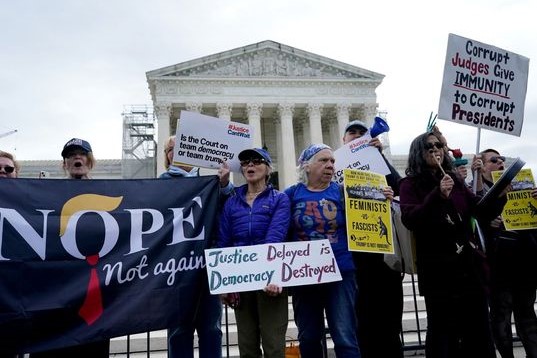Politics
Supreme Court Weighs Trump’s Immunity Claim in Election Interference Case
In a pivotal moment for American jurisprudence, the Supreme Court grappled with former President Donald Trump’s legal maneuver. He sought to evade trial on allegations of attempting to sway the outcome of the 2020 presidential election in favor of President Biden. Thursday’s proceedings marked the culmination of Trump’s efforts to shield himself from prosecution. He advanced a novel claim: that the Constitution erects a barrier against prosecuting former presidents for purported offenses committed during their tenure.
Contentious Arguments
Trump’s counsel, D. John Sauer, stood before the justices, asserting that “presidential immunity from criminal prosecution is indispensable for the preservation of the presidency as we know it.” However, Justice Samuel Alito’s pointed query hinted at skepticism regarding the necessity of such sweeping immunity.
As the court engaged in rigorous interrogation of both Trump’s legal team and the prosecutors, concerns emerged about the ramifications of the lower court rulings that uniformly rebuffed Trump’s assertions. Oral arguments persisted deep into Thursday morning, underscoring the gravity of the constitutional issues at stake.
Legal Strategy Unveiled
The Supreme Court’s decision to grant Trump ample time to present his case underscored its commitment to due process. It rejected pleas from special counsel Jack Smith for an expedited hearing. The extension of the court’s calendar by a day highlighted the significance of the matter as the final argument of the current term. It specifically accommodated Trump’s appeal.
Observers speculated about the potential ramifications of the court’s deliberate pace. They posited that it could inadvertently play into Trump’s hands by prolonging proceedings and postponing trial outcomes past the November election. Such delays could align with Trump’s aspirations to regain federal power, potentially thwarting the prosecution. Advocates of the court’s measured approach contended that rushed resolution of such a complex constitutional dispute would not serve the nation’s best interests. They emphasized the need for thorough deliberation.
Constitutional Conundrum
Central to Trump’s defense is the contention that subjecting former presidents to post-office prosecution would stifle executive decision-making, creating a chilling effect on future administrations. Trump’s legal team leaned heavily on the precedent set in Nixon v. Fitzgerald (1982) granted “absolute immunity” to a former president from civil lawsuits. It argued that this principle should extend to criminal prosecution.
However, according to the Ny Times report, the rulings of both Trump’s trial judge, Tanya Chutkan, and the U.S. The Court of Appeals for the District of Columbia Circuit rejected these arguments. It affirmed that Trump, as a private citizen, is subject to the same legal scrutiny as any other individual.
Judicial Independence
While Trump’s appointments to the Supreme Court have occasionally aligned with his interests, such as in the March ruling overturning Colorado’s decision. On his eligibility for future office after the January 6, 2021 insurrection. However, the court has often ruled against him. Notably, the court dismissed Trump’s attempt to invalidate electoral votes from four states supporting Biden in December 2020, signaling its independence.
One of Trump’s appointees, Justice Kavanaugh, hinted at skepticism regarding Trump’s claims. During confirmation hearings, he emphasized that no one, including a president, is above the law. Kavanaugh suggested that the dispute hinges on whether a president could face criminal prosecution while in office. Alternatively, such proceedings should be deferred until after leaving office.
Absent Defendant
Trump, who is concurrently facing trial in New York on state charges, was notably absent from the courtroom proceedings. The judge overseeing his New York trial declined to adjourn proceedings to enable Trump’s attendance at the Supreme Court hearing.
Acquire a 24-Month Wall Street Journal Print Membership including daily dispatches six days per week, alongside entry to The WSJ digital version on iPhone, Android, and PC. Maintain a tight link to finance, politics, healthcare, and worldwide updates. Special internet proposition featuring a substantial 70% markdown. Enroll promptly! To purchase a subscription, call WSJ Cell Phone: (800) 581-3716

